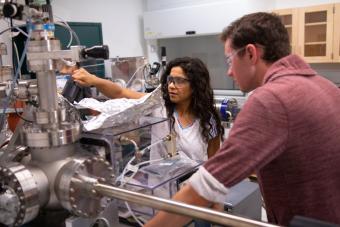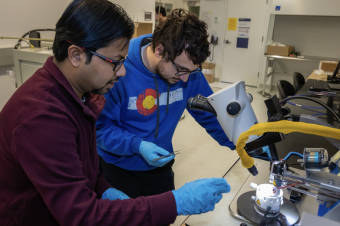Elevate Quantum awarded $40.5M to expand quantum ecosystem in Colorado, Mountain West
Mines is part of regional consortium receiving federal funding to support efforts to strengthen the quantum workforce over the next decade

Elevate Quantum, a designated Tech Hub by the U.S. Department of Commerce Economic Development Administration (EDA), today announced that it has been awarded $40.5 million in federal funding, activating $84 million in matching state support and $1 billion in private capital to help realize its ambitious plans to make the Mountain West — and partner Colorado School of Mines — the global leader in quantum innovation.
In 2023, Elevate Quantum Colorado was designated by the U.S. Department of Commerce as one of the 31 inaugural Tech Hubs in regions across the country that showed potential for rapid growth in key technology sectors. This designation was part of the new Tech Hubs program, developed under the CHIPS and Science Act, to invest directly in high-potential U.S. regions to drive globally competitive innovation centers. Today, the Mountain West consortium consists of 120 organizations including Mines.
"We’re excited and eager to have this once-in-a-lifetime opportunity to work with and support our regional industry and university partners to advance the quantum technologies, companies, and workforce that Colorado and the nation needs,” said Dr. Paul C. Johnson, president of Colorado School of Mines. “Having launched one of the first-ever quantum engineering degree programs at Mines, we’ve seen how this topic and our region has attracted bright and creative students, faculty and innovators as well as entrepreneurs and startups, and we look forward to working with all the partners to ensure that this Tech Hub is successful and accelerates the growth of quantum-related companies and the workforce they will need.”
Currently, around 3,000 Colorado workers are employed in the quantum industry, supporting the growth of more than 30 companies leading advancements in quantum tech. This makes Colorado the largest cluster of quantum companies in the nation. Over the next decade, the number of quantum-related jobs is projected to grow by tens of thousands. These new jobs look more like the aviation sector – with 50-80 percent not requiring advanced degrees – than a PhD research lab.
In 2020, Mines launched one of the nation’s first quantum engineering programs to help address critical workforce shortages, and currently offers quantum engineering graduate certificates and master's degrees, as well as an undergraduate minor.
“You don’t need a PhD to make an impact in quantum engineering – you need quantum literacy, and this program is designed to bring students and working professionals up to speed on key concepts needed by industry today,” said Eliot Kapit, associate professor of physics at Mines.
The federal funding, alongside Colorado’s recently passed $74 million Quantum Tax Credit and New Mexico’s substantial quantum investments, will enable Elevate Quantum to deliver on its key objectives, such as launching 50+ quantum startups, upskilling 30,000 workers, and establishing a world-leading quantum lab to provide state-of-the-art hardware and expertise to startups.





